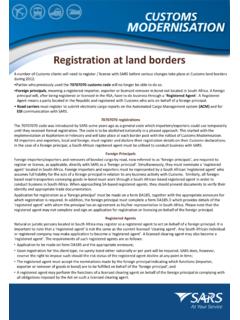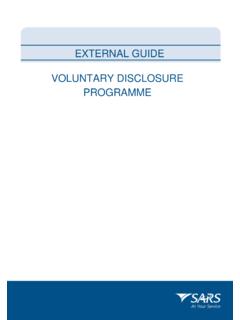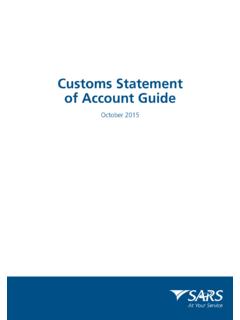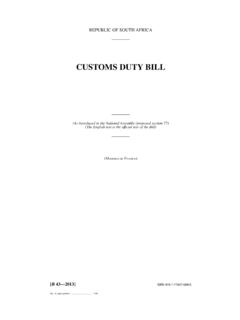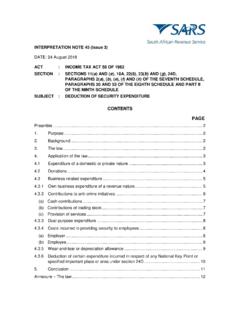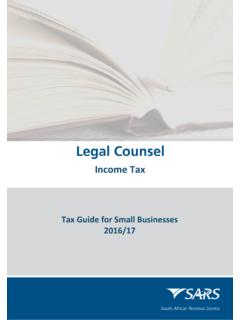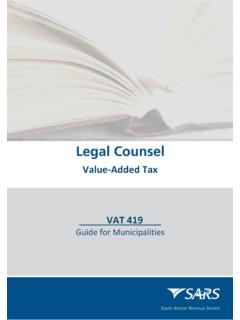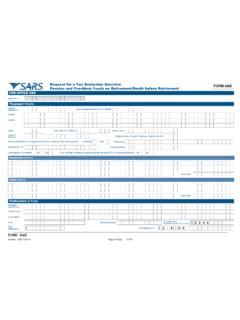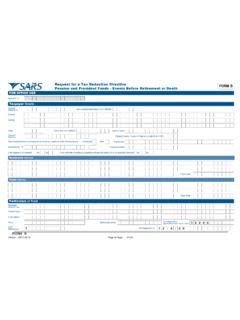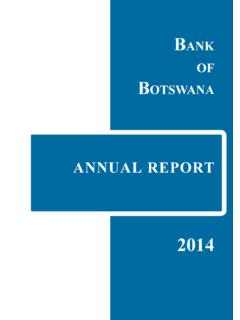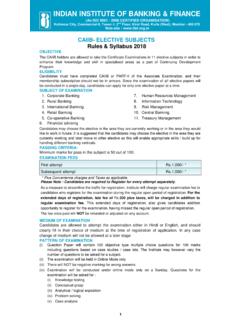Transcription of SE-SB-02 - Health Promotion Levy on Sugary Beverages ...
1 Effective 01 April 2018 EXCISE external policy Health PROMTION LEVY ON Sugary Beverages Effective 01 April 2018 TABLE OF CONTENTS 1 SUMMARY OF MAIN POINTS 3 2 policy 3 Implementation of the Health Promotion Levy (HPL) on Sugary Beverages 3 Liability for levy 4 Keeping of records 5 Penalties 5 Appeal against decision 5 Assessment of the HPL on Sugary Beverages 6 Implementation provisions 6 Declaration of quantity and levy 6 Commercial invoices and dispatch / delivery notes (DN) 6 Removal of Sugary Beverages 7 Movement of Sugary Beverages 7 Levy paid returns 8 Deduction 8 Rate of levy 8 3 REFERENCES 9 Legislation 9 Cross References 9 Quality Records 9 4 DEFINITIONS AND ACRONYMS 9 5 DOCUMENT MANAGEMENT 10 Health Promotion Levy on Sugary Beverages - external policy SE-SB-02 Revision: 9 Page 2 of 10 Effective 01 April 2018 1 SUMMARY OF MAIN POINTS a) This document applies to manufacturers in the sugar Beverages industry.
2 B) This policy does not cover: i) Customs and Excise Payments as this is dealt with in document BP-02; ii) eAccount on eFiling for Excise as this is dealt with in document EA-01-M01; iii) Declaration and Return submission via eFiling as this is dealt with in document SE-ACC-02; iv) Prescribed payment terms/periods as these are dealt with in document SE-PAY-02; v) Submission of accounts/returns as this is dealt with in document SE-CL-12; vi) Licensing and Registration requirements as these are dealt with in document SE-LR-02; vii) Bonds as this is dealt with in document SE-BON-02; viii) Introduction to Excise duties, Levies and Air Passenger Tax (APT) as this is dealt with in document SE-GEN-GEN-04; ix) Refunds as these are dealt with in document SE-REF-07; x) Tariff Determination as these are dealt with in document SE-TDN-02 and xi) The completion of the DA 179 and Schedule Health Promotion Levy Return for Sugary Beverages as this is dealt with in document SE-SB-03-M01.
3 2 policy Implementation of the Health Promotion Levy (HPL) on Sugary Beverages a) Health Promotion Levy (HPL) is legislated in Chapter VB of the Customs and Excise Act No. 91 of 1964 and the Rules thereto. Any provisions, as reflected in Chapter VA and its rules of the Act except as otherwise provided in Chapter VB and the rules shall, as may be applicable, apply to any Health Promotion Levy goods manufactured in or imported into South Africa. b) HPL is imposed on Sugary Beverages manufactured in South Africa in terms of item in Section A of Part 7 of Schedule 1. The levy so specified on the items shall be payable in addition to any duty prescribed in respect of the goods concerned. c) Any person who manufactures Sugary Beverages on the date these rules come into operation or intends manufacturing Sugary Beverages must apply on a DA 185 and the appropriate annexure: i) If he or she qualifies as a non-commercial manufacturer, for registration as a non-commercial manufacturer of Sugary Beverages in terms of Section 59A and the rules thereto; or ii) If he or she is classified as a commercial manufacturer: A) Register as a commercial manufacturer of Sugary Beverages in terms of Section 59A and the rules thereto; and B) License his or her manufacturing premises as a customs and excise manufacturing warehouse for the commercial manufacture of Sugary Beverages .
4 D) Any person who manufacturers, a Sugary beverage containing 4 grams per 100ml or less but the sugar content exceeds the 500 kilograms (Rule ) per calendar year, will be required to license as a commercial manufacturer and submit NIL returns. e) Unless the Commissioner determines otherwise, no security is required to be furnished by a person applying for registration as a non-commercial manufacturer of Sugary Beverages . f) Any reference to sugar means both the intrinsic and added sugar and other sweetening matter contained in any Sugary beverage. g) Any person who manufactures or imports any Sugary beverage that is liable to the HPL must determine and declare the sugar content of the Sugary beverage based on: i) The total sugar content in g/100ml of the Sugary beverage as certified on a valid test report obtained and retained from a testing laboratory accredited with and using methodology recognised by the South African National Accreditation System (SANAS) or the International Laboratory Accreditation Cooperation (ILAC).
5 And Health Promotion Levy on Sugary Beverages - external policy SE-SB-02 Revision: 9 Page 3 of 10 Effective 01 April 2018 ii) The report referred to in item (i) above must be kept available for inspection for a period of five (5) years from the date the Sugary beverage was manufactured or imported and must be produced or submitted at the request of an Officer; or iii) The sugar content that is used for the calculation of the SBL liability is either the actual sugar content of the SBL good as substantiated on an acceptable laboratory test report or the deemed sugar content of 20g/100ml. The declaration of the sugar content in respect of an SBL good with a deemed sugar content must therefore be reflected as 20g/100ml on the DA 179.
6 In practice, the system will apply the normal SBL calculation that first subtracts the threshold of 4g/100ml exempt sugar content from the declared sugar content in the calculation of the final SBL liability; and iv) In the case of powder and liquid concentrates or preparations for the making of Beverages , the sugar content shall be determined based on the total volume of the prepared beverage when mixed or diluted according to the manufacturer s product specifications. h) For the purposes of Rules to , Sugary Beverages manufactured in South Africa may only be entered for removal in bond and exported from a Customs and Excise warehouse (VM) to any place outside South Africa or any place in any other country in the Common Customs Area (CCA).
7 If licensees do not make use of their own transport, a licensed Remover of goods in bond (ROG) must be used. i) All licensees must be registered for eFiling as the submission of the returns and payments can only be made via eFiling. Accounts and payments must be submitted as prescribed in the rules in the format and in accordance with the procedures specified in the eFiling service [Rule (d)]. Other payment methods may only be used if the eFiling service is not available (refer to BP-02). Licensees can register for eFiling on the SARS Website j) If licensees are unable to access the eFiling service, they must visit the nearest SARS Branch Office (B/O) for assistance. The licensee must present the return [DA 179 and DA (in an electronic format)] and the B/O will upload the CSV and capture any other required information on Service Manager (SM).
8 A printed copy of the EXD 01 with the PRN will be handed to the licensee for payment. k) The following provisions have also been catered for: i) Rebate Item A re fund in respect of HPL goods. It should be noted that HPL goods are perishables and could in fact become contaminated or off-specification. For this reason, Rebate Item has been amended to align with similar provisions for perishable goods. It allows for reprocessing or destruction and also the necessary control measures, such as Customs / Excise supervision, documentary evidence, etc. ii) Refund Item A refund provision in respect of HPL goods to be used in the manufacture of HPL or Excise goods. Upon proof of use in such manufacture, a refund can be claimed on a DA 66.
9 Iii) Refund item A refund provision in respect of HPL goods used in the manufacture of other goods is not subject to the Health Promotion levy. Liability for levy a) The liability for the HPL in the Sugary Beverages industry is assessed and the levy collected on a duty at source (DAS) basis. b) On implementation, the accounting period will commence on 1 April 2018 after which the accounting period shall be a calendar month. c) The DA 179 return and DA (CSV) for the Health Promotion levy on Sugary Beverages must be completed, submitted and paid by the VM on a monthly basis. The HPL rate is fixed as contemplated in Part 7A of Schedule 1. d) In the case of powder and liquid concentrate or preparations for the making of Beverages , the sugar content must be calculated based on the total volume of the prepared beverage when mixed or diluted according to the manufacturers product specifications.
10 Health Promotion Levy on Sugary Beverages - external policy SE-SB-02 Revision: 9 Page 4 of 10 Effective 01 April 2018 e) For the purposes of Rule , in respect of the liability and the termination of liability for duty, the liability for duty of a licensee for the manufacture of Sugary Beverages shall cease only: i) Upon proof of payment of Health Promotion levy on such Sugary Beverages and entry for home consumption of such Sugary Beverages ; or ii) Upon proof that the export to any country or removal to any BLNS country of such Sugary Beverages has been received in such country. Keeping of records a) In terms of Rule (a)(1), every licensee must keep proper books, accounts and documents and any data created by means of a computer, of all transactions relating to the activity in respect of which the license is issued.
